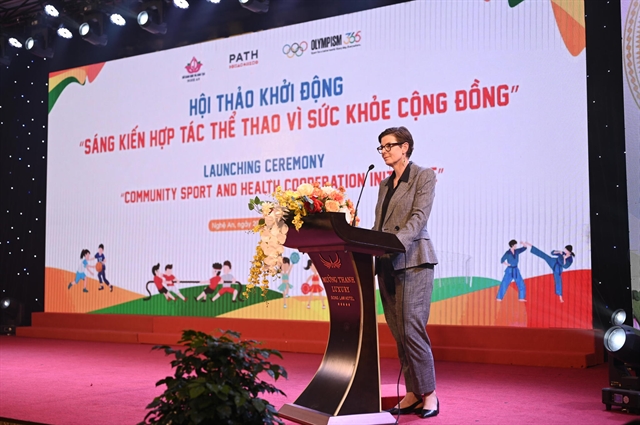Weather:
- Ha Noi 31oC
- Da Nang 28oC
- Ho Chi Minh 27oC

NGHỆ AN — A new drive is underway to get the people of Việt Nam, especially the younger generation, to become more active and take up sports in their communities as a way to stay healthy.
Global innovators, PATH and the Department of Education and Training of Nghệ An Province, officially launched an initiative to promote people's health on January 20.
Entitled 'Sports Cooperation for Community Health' the project is initiated under a three-year technical cooperation agreement signed by the International Olympic Committee (IOC) and the World Health Organisation (WHO) seeking to strengthen the role of community sports and physical activity in building healthier, more active communities.
The initiative specifically seeks to enhance public health through increasing participation in community sports activities, providing training for sport and health professionals, building capacity in institutions and organisations, and delivering behaviour change campaigns promoting a culture of physical activity to improve well-being and reduce the burden of non-communicable diseases.
The initiative's goal is to improve health outcomes by increasing participation in health-enhancing community sports.
It creates and implements sport-based community projects in schools, workplaces and health facilities.
It also trains coaches, teachers, and community health workers to integrate health promotion into their programmes, while building the capacity of organisations to deliver health-enhancing community sports.
The group also has a campaigning role, to encourage people to build physical exercise habits, helping improve quality of life and reduce the non-communicable diseases.
The launch event was hosted by Vice Chairman of the Nghệ An Provincial People’s Committee Buid Đình Long and attended by representatives of international and local relevant units, along with teachers and students from ten schools.
A wake-up call
According to a 2024 WHO report, global physical inactivity rates remain alarmingly high, with 31 per cent of adults being physically inactive, equivalent to 1.8 billion people worldwide.
WHO projects that if current trends continue, global physical inactivity rates could rise to 35 per cent by 2030, affecting 38 per cent of women and 32 per cent of men.
In Việt Nam, the situation is equally concerning. Statistics from a recent survey indicates that about a quarter of Vietnamese adults do not engage in sufficient physical activity.
Youth are even less active worldwide and in Việt Nam. Globally, 81 per cent of adolescents aged 11-17 are physically inactive. In Việt Nam, only one in four teenagers aged 13 to 17 meet the target of one hour of physical activity a day.
This trend poses significant threats to individual health while increasing the strain on healthcare systems and escalating diabetes, cardiovascular disease and cancer.

"These alarming figures, especially among youth, highlight the urgent need for effective partnerships and strategic investments in policies that enable regular, safe, and enjoyable physical activity for this group,” said Dr Angela Pratt, WHO Representative in Việt Nam.
“While the challenges are significant, they also inspire action. We welcome this initiative, call for stronger collaboration among stakeholders and pledge our technical expertise to ensure its success and impact.”
A Synergy for change
The initiative is being implemented in five countries worldwide.
Highlighting the project’s significance, Alejandro Calvente, Olympism365 manager - representative from IOC, said: “Việt Nam will serve as a model. This project will provide valuable insights on how bringing together sport and health sectors to expand and sustain community sports and physical activity programmes can contribute to the global target of 15 per cent reduction in physical inactivity by 2030.
"Proof of concept activities will be implemented and will definitely provide the necessary evidence-base data, best practices and lessons learned to support scaling this initiative, which is framed by the IOC’s Olympism365 Strategy and WHO’s Global Action Plan on Physical Activity 2018-30 (GAPPA) and it is implemented also in Nepal, Tanzania, Ghana and Peru.”
In Việt Nam, the project will be implemented in Nghệ An, aiming to contribute to the reduction of physical inactivity and to increase participation in community sport programmes, improving both physical and mental health in the community.

PATH will lead the implementation of the initiative, beginning with pilot programs in ten key schools in Nghệ An.
As an international nonprofit global health organisation, PATH's mission is to advance health equity through innovation and partnerships.
These efforts will include targeted programs and community engagement events designed to raise awareness about the benefits of physical activity, while building on PATH’s past successes and using innovative approaches to encourage participation.
Supported by the Sports Authority of Việt Nam and the Việt Nam Olympic Committee, the initiative aims to serve as a model for success.
Lessons learned and effective models will be scaled up and replicated across other provinces nationwide, contributing to the broader promotion of community health through sports.
"PATH is proud to serve as the delivery lead for this initiative. We are pleased to join forces with WHO, the IOC, and our partners in Việt Nam to drive positive change in our community through community sport,” said Lê Thị Thu Hiền, director of PATH's Primary Health Care Programme.
“This initiative reaffirms our commitment to promoting a healthier and more sustainable community. Moving forward, in 2025 and beyond, PATH will continue collaborating with partners, governments and local communities to build a sustainable model that empowers primary health care systems to address the rising challenge of non-communicable diseases." — VNS


